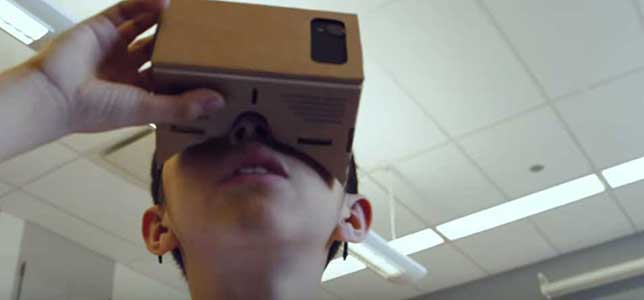Google Seeks Teachers to Pilot 3D Virtual Field Trips

Google Cardboard lets students experience a virtual excursion as an immersive, three-dimensional event.
Google soon will be rolling out a new service, called Expeditions, that could take virtual field trips to a whole new level — and the company is accepting requests from educators to pilot the technology in their classrooms this year.
Using Google's Cardboard, a simple viewing device made out of folded cardboard, with an Android phone, students can experience a virtual excursion as an immersive, three-dimensional event. Reminiscent of the old stereoscopic View-Master devices introduced by Mattel in the late '30s, Google Cardboard turns a smart phone into a cutting-edge virtual-reality viewer that gives an added dimension to virtual field trips.
"Expeditions allows teachers to make their curriculum come alive by taking their students on field trips to almost anywhere they can imagine," according to Google. "Around the globe, on the surface of Mars, on a dive to coral reefs or back in time — abstract concepts come to life in Expeditions, giving students a deeper understanding of the world beyond the classroom."
In a global pilot program announced Sept. 28, Google will be sending teams to train participating teachers. These teachers then will be able to use the technology in their classrooms for the rest of the day.
Google will use their feedback to improve the service before it formally launches, said Emma Ogiemwanye, a corporate communications associate at Google.
The initial phase of this "Pioneer" pilot program will focus on six states — California, Connecticut, Illinois, New Jersey, New York and Texas — and three countries. But educators from across the United States are encouraged to apply, as phase 2 will expand the pilot's reach.
The images used to create the Expeditions are taken from Google Maps and Street View.
Dani Kennis, a ninth and 10th grade world history teacher at Clarkstown High School South in West Nyack, NY, was one of the first educators to try the immersive 3D experience in her classroom.
Kennis traveled to New York in December 2014 to help Google programmers develop an Expedition. The trip she designed was intended to explore cultural diffusion, or how certain cultural aspects spread from one group to another. She chose photo spheres, or 360-degree views, of various European landmarks to illustrate this concept, and then Google programmers built the virtual field trip from these photo spheres.
In May, Kennis got to take her students on the Expedition she helped create.
"My kids were really excited about it," she said. "I created a fake passport for them with their picture on it, and some information about where they were going."
During the virtual field trip, she led them through the photo spheres and prompted them to reflect on what they were seeing. One of the photo spheres showed a city wall in Italy, and she asked her students, "What is the purpose of this city wall?"
The experience "allowed them to tap into their kinesthetic and tactile learning style, because they were standing up and looking all around," she said. "It was the most lively and exciting day I have ever had in my classroom."
Kennis teaches several students who have learning disabilities, but on that day they were fully engaged in the lesson.
"Every student was so engaged and so excited; they felt like they were actually there," she said. "It was amazing to see. It was a really powerful experience to see these students who are typically hard to motivate so immersed in something. That was probably the most amazing and rewarding part of it."
About the Author
Dennis Pierce is a freelance writer with 17 years of experience covering education and technology. He can be reached at [email protected].